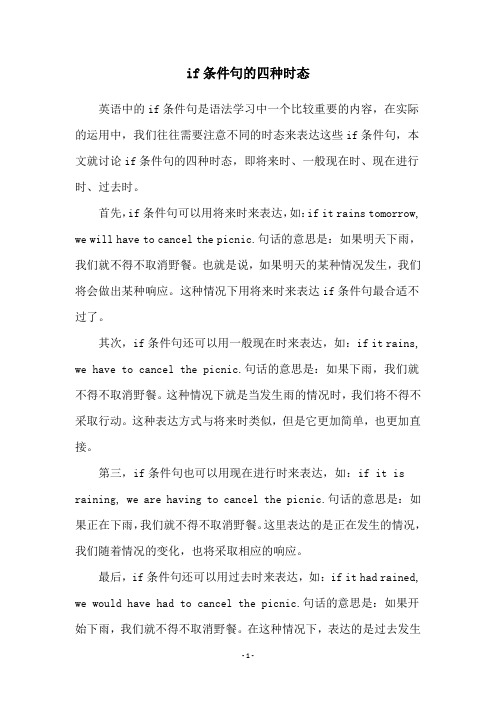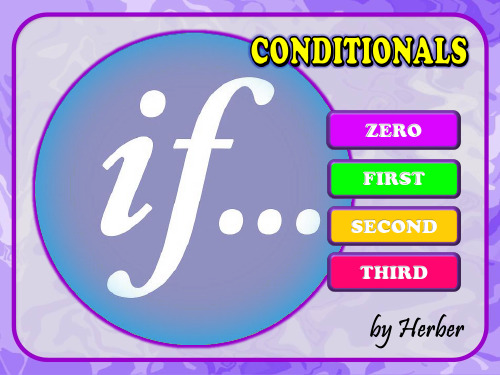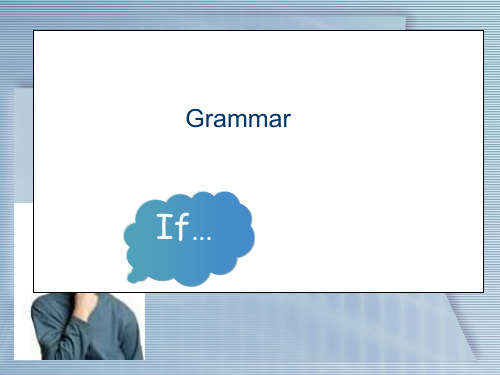If条件句
if will条件句

在英语中,"if" 是一个引导条件状语从句的连词,用来表示一个条件或假设。
当"if" 引导的条件状语从句中包含"will" 时,通常是在讨论将来可能发生的情况。
以下是一些使用"if" 和"will" 的条件句的例子:
1. If it will rain tomorrow, we will cancel the trip.
如果明天会下雨,我们就取消旅行。
2. I will go to the party if you will come with me.
如果你愿意和我一起去,我就去参加聚会。
3. If they will finish the project on time, they will receive a bonus.
如果他们能按时完成项目,他们将获得奖金。
4. We will plant more trees if the weather will allow it.
如果天气允许,我们将种植更多的树木。
5. If she will study hard, she will pass the exam.
如果她努力学习,她会通过考试的。
在这些例子中,"if" 引导的条件状语从句中使用"will" 来表达将来时态,而主句也使用"will" 来表示将来会发生的事情。
if条件状语从句语法

当句末为or not时,引导词只能用whether而不能用if.
第6页
If 与whether 区分
1. I don’t know _____ he will come or not. 与or not 连用只能用whether
2. I don’t care of ______ he is handsome. 介词后只能用whether
3 If she__w__in_s___ (win) the prize ,we _w_i_ll_b__e_(be) happy. 4.If I __d_o_n_’__t _e_at (not,eat )so much ,I _w__il_l _g_e_t__(get) thinner.
5.If you __te_l_l __(tell) them, they __w_o_n_’__t__b_e_li_e_ve(not,believe) you. 6 I __w_i_ll_s_t_a_y_(stay) at home,If it ___ra_i_n_s____( rain). 7.If it _d__o_e_s_n_’__t ___(not,rain) ,I __w__il_l _g_o__( go) out.
5. 以下从句中will不是未来时助动词,而是情态动词。 翻译为“愿意”。
If you will excuse me,I really must go to bed . 假如你能原谅我话,我真要睡觉了。
If you will wait a minute ,I’ll go and tell my mother that you are here .
If you are free this weekend, what will you do ?
if条件句的四种时态

if条件句的四种时态英语中的if条件句是语法学习中一个比较重要的内容,在实际的运用中,我们往往需要注意不同的时态来表达这些if条件句,本文就讨论if条件句的四种时态,即将来时、一般现在时、现在进行时、过去时。
首先,if条件句可以用将来时来表达,如:if it rains tomorrow, we will have to cancel the picnic.句话的意思是:如果明天下雨,我们就不得不取消野餐。
也就是说,如果明天的某种情况发生,我们将会做出某种响应。
这种情况下用将来时来表达if条件句最合适不过了。
其次,if条件句还可以用一般现在时来表达,如:if it rains, we have to cancel the picnic.句话的意思是:如果下雨,我们就不得不取消野餐。
这种情况下就是当发生雨的情况时,我们将不得不采取行动。
这种表达方式与将来时类似,但是它更加简单,也更加直接。
第三,if条件句也可以用现在进行时来表达,如:if it is raining, we are having to cancel the picnic.句话的意思是:如果正在下雨,我们就不得不取消野餐。
这里表达的是正在发生的情况,我们随着情况的变化,也将采取相应的响应。
最后,if条件句还可以用过去时来表达,如:if it had rained, we would have had to cancel the picnic.句话的意思是:如果开始下雨,我们就不得不取消野餐。
在这种情况下,表达的是过去发生过的情况,不论最终如何,事实上我们已经采取了一定措施,结果也有了一定的变化。
以上就是if条件句的四种时态的具体表达方式。
在学习if条件句时,我们应该清楚地认识每种时态的不同特点,以便在使用这种句型时能更准确地表达出我们的思想,从而获得更好的交流效果。
总之,if条件句的四种时态虽然有所不同,但是在每种时态下,表达的都是条件及其后果,其本质上是相同的。
if引导的条件状语从句

if引导的条件状语从句if条件句:条件句用于陈述语气,表示假设的情况可能发生,其中if 是“如果”的意思。
用法例句①主句为一般将来时态,if从句用一般现在时态(即主将从现)。
We will stay at home if it rains tomorrow.如果明天下雨,我将要呆在家。
②主句中含有情态动词,if从句用一般现在时态。
If you finish your homework, you can go home now. 如果你做完了作业,你现在可以回家了。
③主句为祈使句,if从句用一般现在时态。
Don’t jump into the river if you feel very hot. 如果你感到很热,不要跳入河里。
④主句为过去将来时,if从句用一般过去时态(如果涉及到be动词,一律都用were)。
此时,表达的是和现实相反的推测,用虚拟语气。
If I were you, I wouldn’t do it like that.如果我是你,我就不会那么做的。
If you gave me some money, I would be very happy. 如果你给我一些钱,我就会很高兴的。
构成条件从句主句时态If+一般现在时主语+shall/will+动词原形例句If he comes, he will take us to the zoo.1) 用法:(1)条件状语从句通常由连词if引导,意为“如果、假如”,主句不能用be going to表示将来,而应该用shall,will。
If you leave now, you are never going to regret it. (错误)If you leave now, you will never regret it. (正确)(2)if “如果”,引导条件状语从句,主句用一般将来时,从句则用一般现在时,如:If it rains tomorrow, I shan’t climb the hills.(3)另外,主句是祈使句或含有情态动词,从句也用一般现在时。
if引导的条件句是什么从句

if引导的条件句是什么从句if 引导的条件句有真实条件句和非真实条件句两种;1、真实条件句:叙述真实可能发生的事情;例句:If you fail in the exam,you will let him down.如果你考试不及格,你会让他失望的。
扩展资料2、非真实条件句:虚拟语气的一种,表示与实际已发生事实相反:例句:If I were you, I would invite him.如果我是你,我会邀请他。
3、另一个常用连词为unless,大多数时候意思与 if not 相近:例句:Let's go out for a walk unless you are too tired.我们出去散步吧,除非你太累了。
例句:If you are not too tired, let's go out for a walk.如果你不太累,我们出去散步吧。
条件状语从句的基本用法1、用if引导:if意为“如果”。
例句:If you cheat in the exam you’ll never get away with it.考试作弊必予追究。
2、用unless引导:unless的意思是“如果不”“除非”。
例句:Unless you go at once you will be late.如果你不马上走,就会迟到的'。
3、用as [so] long as引导:as [so] long as的意思是“如果”“只要”。
例句:I’ll remember that day as long as I live.只要我活着,我就不会忘记那个日子。
4、用in case引导:in case用连词引导条件状语从句时,其意为“如果”“万一”。
例句:In case I forget, please remind me about it.万一我忘记,请提醒我一下。
5、条件状语从句的时态:当主句为将来时态或含有将来意义时,条件状语从句习惯上要用一般现在时表示将来意义,而不能直接使用将来时态。
if四种条件句

Main clause would/could/might + have + past participle
If I had studied hard, I would have passed my exams.
IIf you had studied hard, you wouldn’t have failed your exam.
If you go to London, you must look right before crossing a street
If clause If + Past Simple
Main clause would / could / might + verb
If I were an astronaut, I would travel in a spaceship.
If I met a Martian, I wouldn’t understand him.
?
IfI aved
If I didn’t understand him, I would come back to the Earth.
If clause If + Past Perfect tense
If I were an astronaut, I would travel in a spaceship.
If I travelled in a spaceship, I would go to Mars.
If I went to Mars, I would meet a Martian.
Nice to meet you!
If I go to London,
I will see the Big Ben.
if条件状语从句的用法_If引导的条件状语从句

if条件状语从句的用法_If引导的条件状语从句很多英语学习者都觉得If引导的条件状语从句这个句型很难,学习起来很吃力。
下面是小编为你整理的If引导的条件状语从句的相关资料,希望大家喜欢!If引导的条件状语从句用法1.if引导的条件状语从句可以放在主句之前,也可以放在主句之后,如果放在主句之前,中间要用逗号将主句和从句隔开。
例如:If I am free, I will come to see you.= I will come to see you if I am free.如果我有空,我就来看你。
2. 在含if引导的条件状语从句的复合句中,主句用一般将来时,从句通常用一般现在时态表示将来意义,即主将从现原则。
例如:If it snows tomorrow, we will go skiing.如果明天下雪,我们就去滑雪。
3. 在含if引导的条件状语从句的复合句中,语句的谓语还可含有情态动词can、must、may等,主句也可是祈使句。
例如:If it stops raining, we can go out.如果雨停了,我们就能出去。
4. 在含if引导的条件状语从句的复合句中,如果主句部分描述的是客观事实或真理,要用一般现在时。
例如:If you heat the ice, it turns into water.如果你加热冰,它就会变成水。
if引导的非真实条件句对过去的虚拟条件从句(if):主语+had done 主句might/would/should/could+have done 对现在的虚拟if+ 主语+动词过去式(be用were)主句might/would/should/could+do对将来的虚拟if+主语+动词过去式(be用were)或主语+should do或主语+were to do主句might/would/should/could+doe.g.Tom got to the station in time because he started earlier.If Tom had started late, he would have missed the train.Do you think the thief entered through the door?No, if he had, I don't believe, he would have broken the living room window.If the book weren't so expensive, I would buy it.If you didn't live so far away, we would be able to visit you more.What would you do if you lost your passport in a foreign country?Why hasn't he come? If he should not come on time, we would have to put off the trip.2.注意事项e.g.If she hadn't work hard at English in the past, she wouldn't work as well as a secretary in a large company now. 混合时间的虚拟语气从句为对过去的虚拟,主句是现在。
if引导的条件句

tired
A:What will you do if you are tired? B: I will… if I am tired.
go to bed/have a rest/listen to music...
Discuss with your partner:
What will you do if you have a lot of money one day?
What’s the rule? (3)
if条件状语从句中,如果主句 是祈使句,从句用一般现在时。
•Let me know if he comes. •Don’t wait for me if I am late. •Put up your hands if you have any questions.
What’s the rule? (2)
if条件状语从句中,如果主句 有must,can,may等情态动 词,从句用一般现在时。
•You must stop if the traffic light is red. •You may go fishing if you are free.
•He can go home if he finishes his homework.
Find the rule (2)
I will take part in the English competition.
Find the rule (2)
Dad will buy a pen for me.
Dad will buy a pen for me. I will take part in the English competition.
What’s the rule? (1)
- 1、下载文档前请自行甄别文档内容的完整性,平台不提供额外的编辑、内容补充、找答案等附加服务。
- 2、"仅部分预览"的文档,不可在线预览部分如存在完整性等问题,可反馈申请退款(可完整预览的文档不适用该条件!)。
- 3、如文档侵犯您的权益,请联系客服反馈,我们会尽快为您处理(人工客服工作时间:9:00-18:30)。
If 条件句
if 条件句不一般,几个要点记心间; 条件句,放在前,逗号要放句中间。
条件句表可能,主句多用将来时;条件句表事实,主句常用现在时。
在if 引导的条件状语从句中,如果从句谈论的是一个有可能发生的事实及其产生的相关的结果,主句用一般将来时态,从句用一般现在时态。
如:We can walk there if we can't find a bus . If it rains tomorrow ,we will not go to the zoo. What will you do if you find a panda in danger. 如果if 条件句谈论的是重复发生和预示要发生的情景和事件,则主从句大多用一般现在时态。
如:If bears are in danger ,they attack people. 注意:在if 引导的条件状语从句中,if 和条件句位置灵活,可直接放在主句后面,若if 条件句放句首,从句后面要加逗号,和主句隔开。
(1)if条件句表可能,主句多用将来时;例如:You will be very luckyif he lets you go without a ticket.如果他没给你罚单就放你走了,算你走运。
(2)if 从句用一般现在时,主句用may/ might/ can,if条件句表事实,主句常用现在时,例如:If you receive arequest like this, you cannot fail to obey it!;If it stops snowing wecan go out.如果雪停了,我们就可以出去。
(3)在if引导的条件状语从句中,如果从句谈论的是一个有可能发生的事实及其产生的相关的结果,主句用一般将来时态,从句用一般现在时态。
If youpark your car in the wrong place, a traffic
policeman will soon findit. 一旦你把汽车停错了地方,交通警很快就会发现。
(4)如果if 条件句谈论的是重复发生和预示要发生的情景和事件,则主从句大多用一般现在时态。
如:If bears are in danger ,they attack people.
(5)if 从句用一般现在时,主句用must/ should,例如:If you want to lose weight you must/ should eat less bread.如果你想减肥,你必须少吃面包。
(6)在if 引导的条件状语从句中,if 和条件句位置灵活,可直接放在主句后面,若if 条件句放句首,从句后面要加逗号,和主句隔开。
二、在说说if句子中的前后时态:
(1)if 从句用一般现在时,主句用一般现在时If you heat ice it turns to water. (也可以用will turn )如果把冰加热,它就会化成水。
(2)if 从句用现在进行时,主句用一般将来时
(3)if 从句用现在完成时,主句用一般将来时
(4) if 从句用一般将来时,主句用一般将来时。
